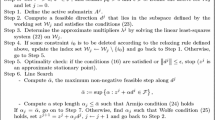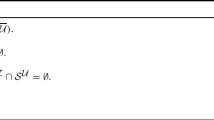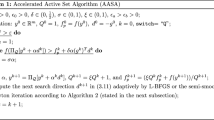Abstract
We consider a mathematical program with complementarity constraints (MPCC). Our purpose is to develop methods that enable us to compute a solution or a point with some kind of stationarity to MPCC by solving a finite number of nonlinear programs. We apply an active set identification technique to a smoothing continuation method (Ref. 1) and propose a hybrid algorithm for solving MPCC. We develop also two modifications: one makes use of an index addition strategy; the other adopts an index subtraction strategy. We show that, under reasonable assumptions, all the proposed algorithms possess a finite termination property. Further discussions and numerical experience are given as well
Similar content being viewed by others
References
Fukushima M., Pang J. S., Convergence of a Smoothing Continuation Method for Mathematical Problems with Complementarity Constraints, Ill-Posed Variational Problems and Regularization Techniques, Edited by M. Théra and R. Tichatschke, Lecture Notes in Economics and Mathematical Systems, Springer Verlag, Berlin, Germany, Vol. 477, pp. 105–116, 1999.
Z.Q. Luo J.S. Pang D. Ralph (1996) Mathematical Programs with Equilibrium Constraints Cambridge University Press Cambridge, United Kingdom
Y. Chen M. Florian (1995) ArticleTitleThe Nonlinear Bilevel Programming Problem: Formulation, Regularity, and Optimality Conditions Optimization 32 193–209 Occurrence Handle96c:90100
M. Fukushima Z. Q. Luo J. S. Pang (1998) ArticleTitleA Globally Convergent Sequential Quadratic Programming Algorithm for Mathematical Programs with Linear Complementarity Constraints Computational Optimization and Applications 10 5–34 Occurrence Handle10.1023/A:1018359900133 Occurrence Handle99e:90088
H. Jiang D. Ralph (2000) ArticleTitleSmooth SQP Methods for Mathematical Programs with Nonlinear Complementarity Constraints SIAM Journal on Optimization 10 779–808 Occurrence Handle10.1137/S1052623497332329 Occurrence Handle2001f:90073
X. Chen M. Fukushima (2004) ArticleTitleA Smoothing Method for a Mathematical Program with P-Matrix Linear Complementarity Constraints Computational Optimization and Applications 27 223–246 Occurrence Handle10.1023/B:COAP.0000013057.54647.6d Occurrence Handle2005a:90159
X. Hu D. Ralph (2004) ArticleTitleConvergence of a Penalty Method for Mathematical Programming with Equilibrium Constraints Journal of Optimization Theory and Applications 123 365–390 Occurrence Handle10.1007/s10957-004-5154-0 Occurrence Handle2005f:90120
X. X. Huang X. Q. Yang D. L. Zhu (2001) A Sequential Smooth Penalization Approach to Mathematical Programs with Complementarity Constraints, Manuscript Department of Applied Mathematics, Hong Kong Polytechnic University Hong Kong
G. H. Lin M. Fukushima (2003) ArticleTitleSome Exact Penalty Results for Nonlinear Programs and Their Applications to Mathematical Programs with Equilibrium Constraints Journal of Optimization Theory and Applications 118 67–80 Occurrence Handle2004e:90127
M. Fukushima P. Tseng (2002) ArticleTitleAn Implementable Active-Set Algorithm for Computing a B-Stationary Point of the Mathematical Program with Linear Complementarity Constraints SIAM Journal on Optimization 12 724–739 Occurrence Handle10.1137/S1052623499363232 Occurrence Handle2003e:90082
F Facchinei H Jiang L Qi (1999) ArticleTitleA Smoothing Method for Mathematical Programs with Equilibrium Constraints Mathematical Programming 85 107–134 Occurrence Handle10.1007/s101070050048 Occurrence Handle2000f:90065
G. H. Lin M. Fukushima (2005) ArticleTitleA Modified Relaxation Scheme for Mathematical Programs with Complementarity Constraints Annals of Operations Research 133 63–84 Occurrence Handle2005i:90080
G. H. Lin M. Fukushima (2003) ArticleTitleNew Relaxation Method for Mathematical Programs with Complementarity Constraints Journal of Optimization Theory and Applications 118 81–116 Occurrence Handle2004g:90109
S. Scholtes (2001) ArticleTitleConvergence Properties of a Regularization Scheme for Mathematical Programs with Complementarity Constraints SIAM Journal on Optimization 11 918–936 Occurrence Handle10.1137/S1052623499361233 Occurrence Handle1010.90086 Occurrence Handle2002g:90138
S. Scholtes M. Stöhr (2001) ArticleTitleHow Stringent Is the Linear Independence Assumption for Mathematical Programs with Complementarity Constraints Mathematics of Operations Research 26 851–863 Occurrence Handle10.1287/moor.26.4.851.10007 Occurrence Handle2002k:90141
Scheel, H., and Scholtes, S., Mathematical Programs with Complementarity Constraints: Stationarity, Optimality, and Sensitivity, Mathematics of Operations Research, Vol. 25, pp. 1–22, 2000.
Burke, J. V., On the Identification of Active Constraints, II: The Nonconvex Case, SIAM Journal on Numerical Analysis, Vol. 27, pp. 1081–1102, 1990.
Burke, J. V., and Moré, J. J., On the Identification of Active Constraints, SIAM Journal on Numerical Analysis, Vol. 25, pp. 1197–1211, 1988.
Facchinei, F., Fischer, A., and Kanzow, C., On the Accurate Identification of Active Constraints, SIAM Journal on Optimization, Vol. 9, pp. 14–32, 1998.
Facchinei, F., Fischer, A., and Kanzow, C., On the Identification of Zero Variables in an Interior-Point Framework, SIAM Journal on Optimization, Vol. 10, pp. 1058–1078, 2000.
Yamashita, N., Dan, H., and Fukushima, M., On the Identification of Degenerate Indices in the Nonlinear Complementarity Problem with the Proximal Point Algorithm, Mathematical Programming, Vol. 99, pp. 377–397, 2004.
Tseng, P., Growth Behavior of a Class of Merit Functions for the Nonlinear Complementarity Problem, Journal of Optimization Theory and Applications, Vol. 89, pp. 17–37, 1996.
S. Leyffer, MacMPEC: AMPL Collection of MPECs, Technical Report; see http://www-unix.mcs.anl.gov/∼leyffer/MacMPEC/, 2000.
Jiang, H., and Ralph, D., QPECgen, a MATLAB Generator for Mathematical Programs with Quadratic Objectives and Affine Variational Inequality Constraints, Computational Optimization and Applications, Vol. 13, pp. 25–59, 1999.
Lin G.H., and Fukushima, M., A Hybrid Algorithms with Active Set Identification for Mathematical Programs with Complementarity Constraints, Technical Report 2002-008, Deparment of Applied Mathematics and Physics, Graduate School of Informatics, Kyoto University, Kyoto, Japan, 2002.
Lin, G.H., and Fukushima, M., Hybrid Algorithms with Index Addition and Subtraction Strategies for Solving Mathematical Programs with Complementarity Constraints, Technical Report 2003-003, Department of Applied Mathematics and Physics, Graduate School of Informatics, Kyoto University, Kyoto, Japan, 2003.
Author information
Authors and Affiliations
Additional information
Communicated by P. Tseng
This work was supported in part by the Scientific Research Grant-in-Aid from the Ministry of Education, Science, Sports, and Culture of Japan. The authors are grateful to Professor Paul Tseng for helpful suggestions on an earlier version of the paper.
Rights and permissions
About this article
Cite this article
Lin, G.H., Fukushima, M. Hybrid Approach with Active Set Identification for Mathematical Programs with Complementarity Constraints. J Optim Theory Appl 128, 1–28 (2006). https://doi.org/10.1007/s10957-005-7549-y
Issue Date:
DOI: https://doi.org/10.1007/s10957-005-7549-y




